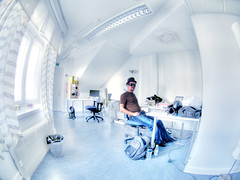Here are five mistakes online job hunters make:
 Image by wili_hybrid via Flickr
Image by wili_hybrid via Flickr1. Forgetting manners.
If you use Twitter or you write a blog, you should assume that hiring managers and recruiters will read your updates and your posts. A December 2009 study by Microsoft Corp. found that 79% of hiring managers and job recruiters review online information about job applicants before making a hiring decision. Of those, 70% said that they have rejected candidates based on information that they found online. Top reasons listed? Concerns about lifestyle, inappropriate comments, and unsuitable photos and videos.
"Everything is indexed and able to be searched," says Miriam Salpeter, an Atlanta-based job search and social media coach. "Even Facebook, which many people consider a more private network, can easily become a trap for job seekers who post things they would not want a prospective boss to see."
Don't be lulled into thinking your privacy settings are foolproof. "All it takes is one person sharing information you might not want shared, forwarding a post, or otherwise breaching a trust for the illusion of privacy in a closed network to be eliminated," says Ms. Salpeter, who recommends not posting anything illegal (even if it's a joke), criticism of a boss, coworker or client, information about an interviewer, or anything sexual or discriminatory. "Assume your future boss is reading everything you share online," she says.
2. Overkill.
Blanketing social media networks with half-done profiles accomplishes nothing except to annoy the exact people you want to impress: prospective employees trying to find out more about on you.
One online profile done well is far more effective than several unpolished and incomplete ones, says Sree Sreenivasan, dean of students at Columbia University Graduate School of Journalism. He made the decision early on to limit himself to three social-networking sites: Facebook, LinkedIn and Twitter. "There is just not enough time," he says. "Pick two or three, then cultivate a presence there."
Many people make the mistake of joining LinkedIn and other social media sites and then just letting their profiles sit publicly unfinished, says Krista Canfield, a LinkedIn spokesperson. "Just signing up for an account simply isn't enough," she says. "At a bare minimum, make sure you're connected to at least 35 people and make sure your profile is 100 percent complete. Members with complete profiles are 40 times more likely to receive opportunities through LinkedIn."
LinkedIn, Facebook, and Twitter are the three most popular social networking sites for human resources managers to use for recruiting, according to a survey released last month by JobVite, a maker of recruiting software.
3. Not getting the word out.
When accounting firm Dixon Hughes recently had an opening for a business development executive, Emily Bennington, the company's director of marketing and development, posted a link to the opportunity on her Facebook page. "I immediately got private emails from a host of people in my network, none of whom I knew were in the market for a new job," she says. " I understand that there are privacy concerns when it comes to job hunting, but if no one knows you're looking, that's a problem, too."
Changing this can be as simple as updating your status on LinkedIn and other social networking sites to let people know that you are open to new positions. If you're currently employed and don't want your boss to find out that you're looking, you'll need to be more subtle. One way to do this is to give prospective employers a sense of how you might fit in, says Dan Schawbel, author of "Me 2.0" and founder of Millennial Branding. "I recommend a positioning, or personal brand statement, that depicts who you are, what you do, and what audience you serve, so that people get a feeling for how you can benefit their company."
4. Quantity over quality.
Choose connections wisely; only add people you actually know or with whom you've done business. Whether it's on LinkedIn, Facebook or any other networking site, "it's much more of a quality game than a quantity game," says Ms. Canfield. A recruiter may choose to contact one of your connections to ask about you; make sure that person is someone you know and trust.
And there's really no excuse for sending an automated, generic introduction, says Ms. Canfield. "Taking the extra five to 10 seconds to write a line or two about how you know the other person and why'd you'd like to connect to them can make the difference between them accepting or declining your connection request," she says. "It also doesn't hurt to mention that you're more than willing to help them or introduce them to other people in your network."
5. Online exclusivity.
Early last year, Washington's Tacoma Public Utilities posted a water meter reader position on its website. The response? More than 1,600 people applied for the $17.76 an hour position.
With the larger number of people currently unemployed (and under-employed), many employers are being inundated with huge numbers of applications for any positions they post. In order to limit the applicant pool, some have stopped posting positions on their websites and job boards, says Tim Schoonover, chairman of career consulting firm OI Partners.
Scouring the Web for a position and doing nothing else is rarely the best way to go. "When job-seekers choose to search for jobs exclusively online– rather than also include in-person networking–they may be missing out on 'hidden' opportunities," says Mr. Schoonover. "Higher-level jobs are not posted as often as lower-level jobs online. In-person networking may be needed to uncover these higher-level positions, which may be filled by executive recruiters."























